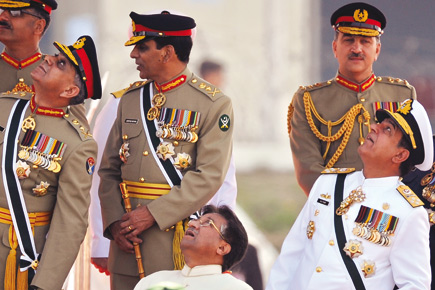by MUHAMMAD HANIF

How Pakistan’s Generals turned the country into an international jihadi tourist resort
What is the last thing you say to your best general when ordering him into a do-or-die mission? A prayer maybe, if you are religiously inclined. A short lecture, underlining the importance of the mission, if you want to keep it businesslike. Or maybe you’ll wish him good luck accompanied by a clicking of the heels and a final salute.
On the night of 5 July 1977 as Operation Fair Play, meant to topple Zulfiqar Ali Bhutto’s elected government, was about to commence, then Army Chief General Zia ul Haq took aside his right-hand man and Corps Commander of 10th Corps Lieutenant General Faiz Ali Chishti and whispered to him: “Murshid, marwa na daina.” (Guru, don’t get us killed.)
General Zia was indulging in two of his favourite pastimes: spreading his paranoia amongst those around him and sucking up to a junior officer he needed to do his dirty work. General Zia had a talent for that; he could make his juniors feel as if they were indispensable to the running of this world. And he could make his seniors feel like proper gods, as Bhutto found out to his cost.
General Faiz Ali Chishti’s troops didn’t face any resistance that night; not a single shot was fired, and like all military coups in Pakistan, this was also dubbed a ‘bloodless coup’. There was a lot of bloodshed, though, in the following years—in military-managed dungeons, as pro-democracy students were butchered at Thori gate in interior Sindh, hundreds of shoppers were blown up in Karachi’s Bohri Bazar, in Rawalpindi people didn’t even have to leave their houses to get killed as the Army’s ammunition depot blew up raining missiles on a whole city, and finally at Basti Laal Kamal near Bahawalpur, where a plane exploded killing General Zia and most of the Pakistan Army’s high command. General Faiz Ali Chishti had nothing to do with this, of course. General Zia had managed to force his murshid into retirement soon after coming to power. Chishti had started to take that term of endearment—murshid—a bit too seriously and dictators can’t stand anyone who thinks of himself as a kingmaker.
Thirty-four years on, Pakistan is a society divided at many levels. There are those who insist on tracing our history to a certain September day in 2001, and there are those who insist that this country came into being the day the first Muslim landed on the Subcontinent. There are laptop jihadis, liberal fascist and fair-weather revolutionaries. There are Balochi freedom fighters up in the mountains and bullet-riddled bodies of young political activists in obscure Baloch towns. And, of course, there are the members of civil society with a permanent glow around their faces from all the candle-light vigils. All these factions may not agree on anything but there is consensus on one point: General Zia’s coup was a bad idea. When was the last time anyone heard Nawaz Sharif or any of Zia’s numerous protégés thump their chest and say, yes, we need another Zia? When did you see a Pakistan military commander who stood on Zia’s grave and vowed to continue his mission?
It might have taken Pakistanis 34 years to reach this consensus but we finally agree that General Zia’s domestic and foreign policies didn’t do us any good. It brought us automatic weapons, heroin and sectarianism; it also made fortunes for those who dealt in these commodities. And it turned Pakistan into an international jihadi tourist resort.
And yet, somehow, without ever publicly owning up to it, the Army has continued Zia’s mission. Successive Army commanders, despite their access to vast libraries and regular strategic reviews, have never actually acknowledged that the multinational, multicultural jihadi project they started during the Zia era was a mistake. Late Dr Eqbal Ahmed, the Pakistani teacher and activist, once said that the Pakistan Army is brilliant at collecting information but its ability to analyse this information is non-existent.
Looking back at the Zia years, the Pakistan Army seems like one of those mythical monsters that chops off its own head but then grows an identical one and continues on the only course it knows.
In 1999, two days after the Pakistan Army embarked on its Kargil misadventure, Lieutenant General Mahmud Ahmed gave a ‘crisp and to the point’ briefing to a group of senior Army and Air Force officers. Air Commodore Kaiser Tufail, who attended the meeting, later wrote that they were told that it was nothing more than a defensive manoeuvre and the Indian Air Force will not get involved at any stage. “Come October, we shall walk into Siachen—to mop up the dead bodies of hundreds of Indians left hungry, out in the cold,” General Mahmud told the meeting. “Perhaps it was the incredulousness of the whole thing that led Air Commodore Abid Rao to famously quip, ‘After this operation, it’s going to be either a Court Martial or Martial Law!’ as we walked out of the briefing room,” Air Commodore Tufail recalled in an essay.
Open for more
(Thanks to Razi Azmi)
